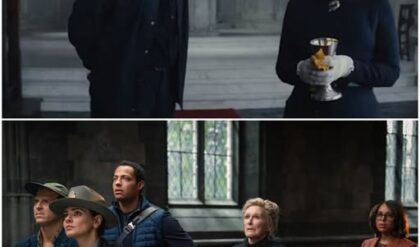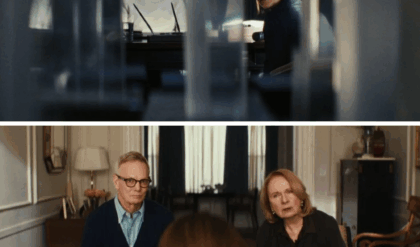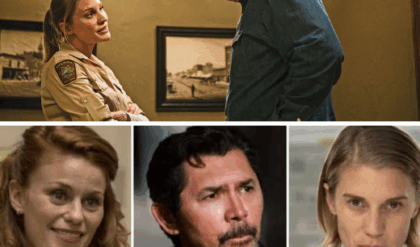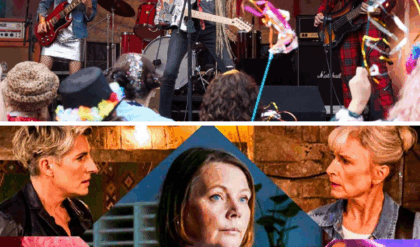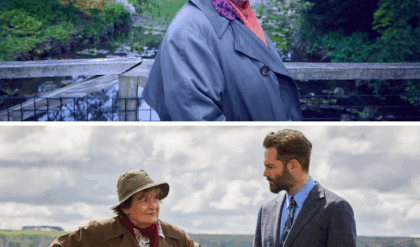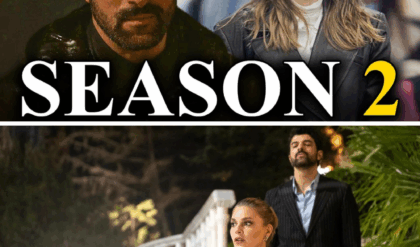In the dim-lit council flats of a rain-swept Manchester suburb, where the hum of distant traffic mingles with the muffled cries of a fractured family, Netflix has quietly detonated a narrative bomb: Responsible Child. This 90-minute BBC drama, originally aired in December 2019 and now surging to the streamer’s top spot as of November 15, 2025, isn’t just a true-crime retelling—it’s a scalpel to the gut of Britain’s justice system. Inspired by the gut-wrenching 2013 case of brothers Jerome and Joshua Ellis, who stabbed their abusive stepfather to death in a desperate act of self-preservation, the film follows 12-year-old Ray McCullin (Billy Barratt) as he navigates the adult machinery of a murder trial. What begins as a portrait of domestic hell escalates into a courtroom crucible that forces viewers to confront an uncomfortable truth: When does a child’s terror cross into culpability? In a nation where the age of criminal responsibility sits at a stark 10—among the world’s lowest, drawing UN rebukes for breaching child rights conventions—Responsible Child doesn’t just shock; it indicts. “It’s not entertainment,” one X user posted after a midnight binge, “it’s a mirror to our failures. I haven’t stopped shaking.”
The story unfolds in dual timelines, a narrative sleight-of-hand that director Nick Holt deploys with unflinching precision. We first meet Ray in the suffocating confines of his family’s cramped flat, a pressure cooker of poverty and peril. Played with heartbreaking authenticity by then-12-year-old Barratt—whose wide-eyed vulnerability recalls a young Jacob Tremblay in Room—Ray is no wide-eyed innocent; he’s a pint-sized sentinel, shouldering the care of his infant half-siblings while his mother, Veronica (Debbie Honeywood, raw and ravaged from Sorry We Missed You), spirals into denial. Enter Scott (Shaun Dingwall), Veronica’s boyfriend and the family’s resident storm cloud: a hulking ex-con with a temper like lit fuse, whose “discipline” leaves bruises blooming like dark flowers on the children’s skin. Dingwall imbues Scott with a chilling banality—his rages erupt not in cartoon villainy but in the everyday cruelties of slammed doors and shattered plates—making his menace all the more insidious.
The inciting horror builds like a gathering thunderhead. Flashbacks reveal years of escalating abuse: Scott’s axe-wielding assault on Ray’s older brother Nathan (James Tarpey, brooding with quiet fury), a near-fatal beating that lands Nathan in hospital. Ray, ever the peacemaker, shuttles between schoolyard taunts—”Your mum’s a slag, your stepdad’s a psycho”—and homefront skirmishes, his small frame a buffer against the chaos. Social services hover like ghosts, their interventions as perfunctory as a form stamped in triplicate; teachers note Ray’s truancy but chalk it up to “family issues.” It’s a portrait of systemic blindness, where the cracks in child protection swallow screams whole. Then, one fateful night, the dam breaks. As Scott slumbers on the sofa, reeking of cheap lager, Nathan and Ray arm themselves with kitchen knives. What follows is a frenzied, fog-shrouded attack—18 stab wounds in the dim kitchen light—that leaves Scott bleeding out on the linoleum. The brothers’ arrest is swift: Nathan, 23, cuffed and carted to adult holding; Ray, bundled into a foster home, his teddy bear confiscated like contraband.

The trial sequences are where Responsible Child truly lacerates, transforming the Old Bailey’s oak-paneled solemnity into a surreal farce. Ray, dwarfed in the dock by his oversized suit, faces prosecution barrister William Ramsden (Tom Burke, all sharp suits and sharper scrutiny from The Strike series), who paints the boy as a calculating killer. “He knew what he was doing,” Ramsden intones, his voice a velvet noose, dissecting Ray’s “premeditation” with clinical detachment. Defending him is Kerry (Michelle Fairley, channeling Game of Thrones‘ Catelyn Stark steel), a battle-hardened barrister whose empathy wars with the law’s rigidity. Fairley’s Kerry is a revelation—her courtroom monologues crackle with moral fury, pleading for manslaughter over murder on grounds of “loss of control,” a legal lifeline born of years of abuse. Supporting the fray: Owen McDonnell as the empathetic social worker Tommy, Stephen Campbell Moore as the probing child psychologist Dr. Keaton, and Stephen Boxer as the impassive Judge Walden, whose gavel falls like fate’s indifferent hammer.
Holt, a BAFTA-winning documentarian whose The Murder Trial embedded cameras in Scotland’s High Court, brings journalistic rigor to the drama. Filmed in Manchester’s gritty underbelly—council estates standing in for the Ellis brothers’ north London roots—the visuals are handheld and hushed, shadows pooling like unspoken fears. Sean Buckley’s script, honed from Skins‘ raw youth tales, weaves legal jargon with poetic gut-punches: Ray’s whispered confession to Kerry—”He was gonna kill us all”—hangs like a noose. The film’s intimacy amplifies its horror; close-ups linger on Ray’s trembling hands as he recounts the stabbing, his voice cracking like thin ice. It’s unflinching without exploitation— no graphic gore, but the emotional carnage is visceral, echoing the restraint of Unbelievable or When They See Us.
At its heart, Responsible Child is a requiem for innocence weaponized. Inspired by the Ellis case—where 14-year-old Jerome (fictionalized as 12-year-old Ray for dramatic compression) and 23-year-old Joshua fatally stabbed their stepfather, Clinton Fuller, after enduring threats and beatings—the film fictionalizes details for privacy and punch. In reality, Jerome was convicted of manslaughter due to provocation, serving time in a young offenders’ institution before release in his early 20s; his whereabouts remain shielded. Joshua drew a life sentence with a 14-year minimum. Holt attended their trial while researching his doc, struck by the absurdity: a boy too young to consent to medical treatment or buy fireworks, yet old enough for a life term. “It’s a story I’ve wanted to tell for years,” Holt reflected in pre-release interviews, decrying the UK’s low threshold as a “breach of UN conventions.” The film doesn’t preach; it provokes, intercutting Ray’s foster-home isolation—nights spent sketching his siblings—with trial testimonies that expose the abuse’s toll.
Awards crowned its prescience: an International Emmy for Best TV Movie/Miniseries in 2020, plus a BAFTA nod for Barratt’s luminous turn. Critics hailed it as “harrowing agitprop” (The Guardian) and a “searing indictment” (Radio Times), praising its refusal to sentimentalize. Letterboxd users echo: “Billy Barratt breaks you—raw, real, unforgettable.” Yet some fault its brevity; at 90 minutes, the dual timelines occasionally rush the emotional buildup, leaving Nathan’s arc underdeveloped. Still, its power endures: a polemic disguised as procedural, questioning not just culpability but complicity—why did social workers ignore the red flags? Why does the law equate a child’s snap with adult malice?
Viewers, rediscovering it on Netflix, are reeling. X (formerly Twitter) buzzes with raw confessions: “Responsible Child gutted me—true story makes it worse. How do we let kids down this hard?” one user vented, sparking threads on #AgeOfResponsibility. Another: “Sobbing through credits. Billy Barratt’s eyes… haunting.” Comparisons to Netflix’s Adolescence—a 2025 hit about a 13-year-old killer—abound, with fans dubbing Responsible Child the “superior gut-punch” for its legal depth. Streams hit 12 million hours in week one, per Parrot Analytics, spiking searches for child rights reforms. Forums dissect the verdict (no spoilers: it lands with quiet devastation, mirroring Jerome’s manslaughter win), while parents share teary posts: “Made me hug my kids tighter—and rage at the system.”
Production lore adds poignancy. Kudos Films, fresh off Capital‘s Emmy, partnered with 72 Films for authenticity; Buckley drew from court transcripts, Holt from his trial embeds. Barratt, spotted in Prince, prepped with child psychologists, his performance a tightrope of terror and tenderness. The ensemble—Fairley’s gravitas, Burke’s menace—elevates the stakes, their chemistry crackling in cross-exams that feel ripped from headlines. Budgeted modestly at £2 million, it prioritizes intimacy over flash, a stark contrast to Netflix’s glossy true-crime slate.
Yet Responsible Child‘s true reckoning lies beyond the screen. In a post-Don’t F**k with Cats era of viral vigilantism, it spotlights prevention over punishment: the UN’s pleas for raising the responsibility age to 14, ignored since 1995; the 7,000+ kids tried as adults since then. As Ray’s foster mum (a cameo by Honeywood) whispers, “You’re not a monster—you’re just a boy,” the film pleads for mercy in a merciless machine. Streaming now, it’s a call to arms: Can we hold systems accountable before they devour the vulnerable? In Ray’s fractured gaze, we see our own reflections—haunted, human, hungry for justice that heals.
For parents, activists, or anyone wrestling with the world’s wounds, Responsible Child isn’t binge fodder; it’s a catalyst. It lingers like a bruise, demanding: Who’s truly responsible? Stream if you dare—but brace for the fallout. Innocence, once shattered, doesn’t mend clean.
